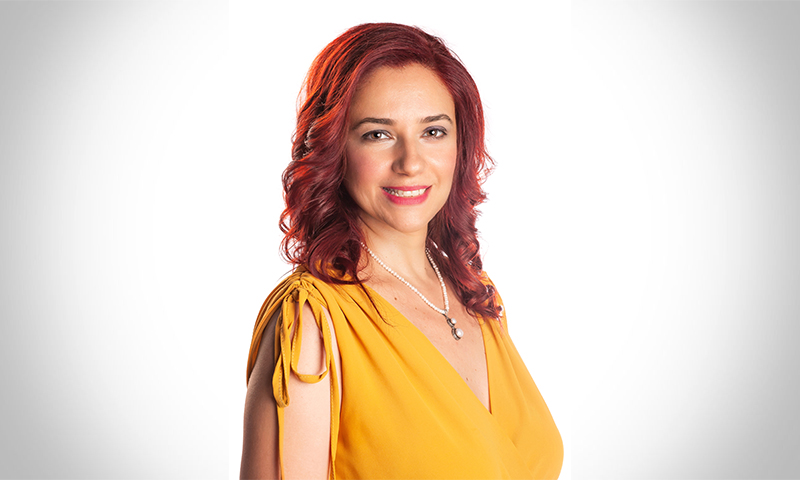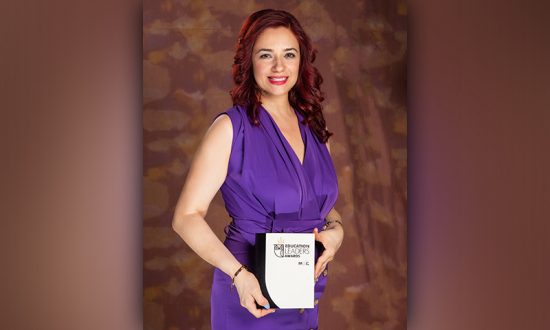A passionate researcher on cognitive psychology and cognitive neurosciences from Greece, Rania Lampou is a finalist of Global Teacher Prize 2019 and the recipient of many national and international awards. She is also the founder of four international projects that focus on the United Nations’ Sustainable Development Goals described in the 2030 Agenda. Recently, Rania Lampou achieved Distinguished Teacher 2020 Award, one of the most coveted recognitions in Greece that rewards good practices in education. In an interaction with Higher Education Digest, Rania Lampou reacts on the Distinguished Teacher 2020 Award and talks about her teaching career, goals and many more.
Heartiest congratulations on your Distinguished Teacher 2020 Award. What is your first reaction to receiving such a coveted award?
I thought that it was the just reward of years of dedicated educational work. I really felt grateful towards the committee who recognized my contribution to education. Throughout the years I worked in education, I have met several people who supported me and believed in me. I would like to thank them all because they all helped me achieve this distinction which is the fifteenth award that I obtained.
Can you give us a brief background of your teaching career?
I am an educator, a STEM instructor, and an ICT teacher-trainer in Greece. I have been awarded many national and international prizes, and I am a Global Teacher Prize finalist 2019. I am also the founder of four international projects that focus on the United Nations’ Sustainable Development Goals described in the 2030 Agenda. My main interest is the combination of STEM with other fields of education such as physics, astronomy and language teaching. I also have a Postgraduate Degree in Language Teaching related to cognitive neurosciences. I am a passionate researcher on cognitive psychology and cognitive neurosciences.
Do you consider that you have reached the peak of your career? Have you set yourself any other goals for the future?
I do not think that the career of an evolving educator can reach its peak. There are always new challenges and new goals. There are also obstacles that I need to overcome. This is a never-ending process. For the future, I want to expand my STEM projects. Furthermore, I want to work more on the relation between neuroeducation and special education, and I am going to deepen and systematize my research.
What is the purpose of school in this era of technology? How do you see your role as a teacher?
Education is meant to prepare children for their future roles as well-balanced adults in a fast-changing society. In other words, schools are orientated towards the future. At the same time, education must help children to deal with the past and the present because every child has a story and he or she should make the most of it. The child must see himself or herself as a hero and as a leader of their lives, not as a victim of circumstances. My role as a teacher is complex. I accompany children through the process of their development, showing them the best possible avenue to the future. Part of the knowledge that children should have to face the future is the knowledge of technology, and STEM education plays a leading role here.

Today, what is the changing role of the teacher, and how do we support that new role?
Today, teachers are not authorities that students see as sources of knowledge. Knowledge is accumulated every day, and no human being can say that they have a good grasp of a subject and the mastery of knowledge in a certain area. Teachers are learning every day like their students. Today teachers can only show students the way to develop their critical thought, their skills, and their process of learning. They are facilitators rather than lecturers. We can support this new role by sensing the learning needs of our students, by involving them more and more in the educational process and by showing them the way we think, we learn, and we draw conclusions.
Since there are numerous sources available to gain knowledge, how do we change policy to support more flexible time and place for learning?
The numerous sources available support students’ autonomous learning and independent research. Teachers can provide links and ideas, as starting points for the students’ learning journey. In the age of information, teachers can’t pretend to be authorities on anything.
What are the essential practices of teachers in a system where students are learning outside of school?
The new role that teachers have to play is not the same as in the previous centuries. They need to teach students how to learn rather than how to memorize a standard textbook. In an era when there is an abundance of information, critical thinking, discernment, organization, and motivation are much more important than listening and memorizing the lessons given by a certain teacher.
How do we ensure those without privilege have equal access to quality education and opportunity?
Governments should provide infrastructure and resources to eliminate the educational gap and the digital divide that are the results of socioeconomic differences among students. The effect of socioeconomic factors is a phenomenon that we shouldn’t ignore if we want to secure equality of opportunities among children of a country.
You are an inspiration for the world now. Please tell us who or what inspires you in everyday life?
My primary source of inspiration is the children of the oncological hospital who despite their terminal diseases, participate in my projects with great enthusiasm. Another group that inspires me are the children of refugees who under the worst imaginable circumstances still want to learn and cultivate their skills. The most inspiring of all is the children from Africa and India who did a great job implementing my international projects and proved their skills to the whole world.
Do you get time off from your busy schedule? What are your other interests/hobbies?
I try to take time off my busy schedule because I need to keep my life balanced. Therefore, I have other interests and hobbies, such as art, music, and theatre. I also write articles like entries in Wikipedia.
What message would you like to share with us at this moment?
This is an ever-changing world, and sometimes it is hostile to people and especially to children. We, as teachers, are called to take action to defend the future of humanity.




